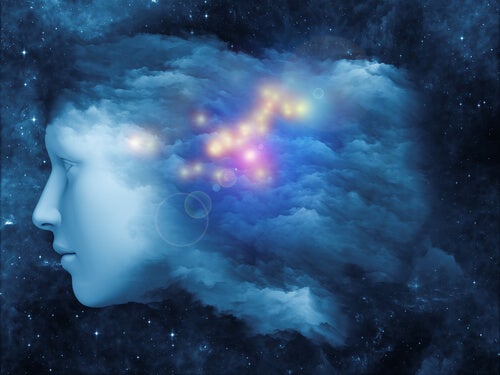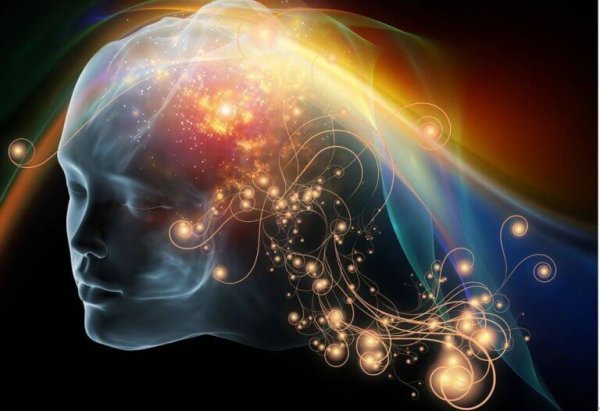The Six Types of Consciousness

Consciousness is a mental process via which you perceive your individuality with your thoughts, feelings, memories, sensations, and environments. It’s thanks to this ability that you’re able to recognize, understand, and judge your own existence and that of others. Essentially, consciousness is the experience of yourself and the world around you.
As you develop in different contexts, your experiences and your understanding of others and yourself change. These changes lead to the appearance of different forms of consciousness that help you to connect with what’s happening in reality, both internal and external. Next, we’ll examine six types of consciousness.
Types of consciousness
Among the various types of consciousness that exist in the human being, we find the following:
1. Individual consciousness
This is the type of awareness you possess of yourself in a particular context. Through it, you can determine what’s good and bad for you, allowing you to make life plans. Individual consciousness promotes the recognition of the self, and of being a particular person who’s different from others.
However, the individuality in which this consciousness immerses you can end up alienating you from the world and from other people. Indeed, although this form of awareness allows you to know yourself, it can also cause or exacerbate feelings of loneliness.

2. Social awareness
Social awareness allows you to know others and society. Through it, you’re able to reason about what’s best or worst for society and to understand yourself as a social being who’s linked to a community that goes way beyond you.
Thanks to this awareness, you’re able to recognize the problems and needs that people have in a group or community. Social awareness is important in fighting for social transformation, liberation, justice, and social welfare. Occasionally, this kind of awareness is overshadowed by the current models of individual competence, where the connection between you, as a social being, and the awareness of your own existence, is diluted (Tum, 2012).
3. Emotional awareness
This type of awareness refers to the ability you have to become aware of your own emotions and those of others. It’s composed of three elements (Bisquerra and Pérez, 2007):
- Becoming aware of your own emotions. The ability to accurately perceive your own feelings and emotions and to identify and label them.
- Naming emotions. How efficiently you use appropriate emotional vocabulary and expressions that are available to you in your cultural context.
- Understanding the emotions of others. The ability to accurately perceive the emotions and perspectives of others and to empathically engage in their emotional experiences.
4. Time consciousness
This concerns your consciousness about the passing of time. This type of awareness is also an awareness of yourself. Indeed, time is something that you are, it constitutes you. Therefore, time consciousness is an awareness of yourself.
The understanding that time flows from the present to the future is largely due to your awareness of time. Perceiving yourself in this timeline is a fundamental property of the consciousness that configures you. In this way, we all end up continually being a past that’s ceased to exist and a future that doesn’t yet exist (Cox, 2020).
5. Psychological awareness
This type of consciousness refers to the ability to examine yourself and to examine and analyze your situation in the world. Psychological awareness also allows you to recognize the meaning of your actions and those of others. It helps you understand the motives and intentions underlying all behavior.
Psychological awareness is related to the ability to see the relationships between thoughts, feelings, and actions in order to learn the meanings and causes of experiences and behaviors (Appelbaum, 1973). It implies a process of reflection on the psychological processes, relationships, and meanings through affective and intellectual dimensions (Hall, 1992).

6. Moral conscience
This is the awareness you have concerning rules and moral standards. It challenges you about what you should do, about what’s right and wrong, and about good and evil. In fact, through moral awareness, you’re able to discern between what’s good, acceptable, and appropriate, and bad, inappropriate, or out of place.
Moral conscience is based on reason and the existence of external elements that allow its correctness to be evaluated (Valderrama and López, 2011). Your judgments that originate from it are present in each act that you carry out. Furthermore, the possibility of acting in accordance with it corresponds to your desire to be consistent with your beliefs and values.
These types of consciousness allow us to affirm that all consciousness emerges from a relational process, from an interaction between a subject and an object. It’s an intentional process that always involves something else. Indeed, consciousness is always consciousness of something. It might be the individual, society, time, emotions, the mind, or morality. There’s no consciousness isolated from the world, it’s always related to it.
Consciousness is a mental process via which you perceive your individuality with your thoughts, feelings, memories, sensations, and environments. It’s thanks to this ability that you’re able to recognize, understand, and judge your own existence and that of others. Essentially, consciousness is the experience of yourself and the world around you.
As you develop in different contexts, your experiences and your understanding of others and yourself change. These changes lead to the appearance of different forms of consciousness that help you to connect with what’s happening in reality, both internal and external. Next, we’ll examine six types of consciousness.
Types of consciousness
Among the various types of consciousness that exist in the human being, we find the following:
1. Individual consciousness
This is the type of awareness you possess of yourself in a particular context. Through it, you can determine what’s good and bad for you, allowing you to make life plans. Individual consciousness promotes the recognition of the self, and of being a particular person who’s different from others.
However, the individuality in which this consciousness immerses you can end up alienating you from the world and from other people. Indeed, although this form of awareness allows you to know yourself, it can also cause or exacerbate feelings of loneliness.

2. Social awareness
Social awareness allows you to know others and society. Through it, you’re able to reason about what’s best or worst for society and to understand yourself as a social being who’s linked to a community that goes way beyond you.
Thanks to this awareness, you’re able to recognize the problems and needs that people have in a group or community. Social awareness is important in fighting for social transformation, liberation, justice, and social welfare. Occasionally, this kind of awareness is overshadowed by the current models of individual competence, where the connection between you, as a social being, and the awareness of your own existence, is diluted (Tum, 2012).
3. Emotional awareness
This type of awareness refers to the ability you have to become aware of your own emotions and those of others. It’s composed of three elements (Bisquerra and Pérez, 2007):
- Becoming aware of your own emotions. The ability to accurately perceive your own feelings and emotions and to identify and label them.
- Naming emotions. How efficiently you use appropriate emotional vocabulary and expressions that are available to you in your cultural context.
- Understanding the emotions of others. The ability to accurately perceive the emotions and perspectives of others and to empathically engage in their emotional experiences.
4. Time consciousness
This concerns your consciousness about the passing of time. This type of awareness is also an awareness of yourself. Indeed, time is something that you are, it constitutes you. Therefore, time consciousness is an awareness of yourself.
The understanding that time flows from the present to the future is largely due to your awareness of time. Perceiving yourself in this timeline is a fundamental property of the consciousness that configures you. In this way, we all end up continually being a past that’s ceased to exist and a future that doesn’t yet exist (Cox, 2020).
5. Psychological awareness
This type of consciousness refers to the ability to examine yourself and to examine and analyze your situation in the world. Psychological awareness also allows you to recognize the meaning of your actions and those of others. It helps you understand the motives and intentions underlying all behavior.
Psychological awareness is related to the ability to see the relationships between thoughts, feelings, and actions in order to learn the meanings and causes of experiences and behaviors (Appelbaum, 1973). It implies a process of reflection on the psychological processes, relationships, and meanings through affective and intellectual dimensions (Hall, 1992).

6. Moral conscience
This is the awareness you have concerning rules and moral standards. It challenges you about what you should do, about what’s right and wrong, and about good and evil. In fact, through moral awareness, you’re able to discern between what’s good, acceptable, and appropriate, and bad, inappropriate, or out of place.
Moral conscience is based on reason and the existence of external elements that allow its correctness to be evaluated (Valderrama and López, 2011). Your judgments that originate from it are present in each act that you carry out. Furthermore, the possibility of acting in accordance with it corresponds to your desire to be consistent with your beliefs and values.
These types of consciousness allow us to affirm that all consciousness emerges from a relational process, from an interaction between a subject and an object. It’s an intentional process that always involves something else. Indeed, consciousness is always consciousness of something. It might be the individual, society, time, emotions, the mind, or morality. There’s no consciousness isolated from the world, it’s always related to it.
All cited sources were thoroughly reviewed by our team to ensure their quality, reliability, currency, and validity. The bibliography of this article was considered reliable and of academic or scientific accuracy.
- Appelbaum, S. A. (1973). Psychological-mindedness: Word, concept and essence. International Journal of Psycho-Analysis, 54, 35-46.
- Bisquerra, R. y Pérez, N. (2007). Las competencias emocionales. UNED Educación XX1, 10, 61-82.
- Cox, G. (2020). Guía existencialista para la muerte, el universo y la nada. Alianza Editorial.
- Hall, J. A. (1992). Psychological-mindedness: A conceptual model. American Journal of psychotherapy, 46(1), 131-140.
- Tum, R. M. (2012). Humanismo y conciencia social: herramientas para transformar el mundo. Estudios Sociales. Revista de Alimentación Contemporánea y Desarrollo Regional, (2), 13-27.
- Valderrama, A. y López, R. (2011). Conciencia moral: ampliando su aplicación en salud. Aspectos teóricos y prácticos de los juicios de conciencia en Chile. Acta bioethica, 17(2), 179-188.
This text is provided for informational purposes only and does not replace consultation with a professional. If in doubt, consult your specialist.







